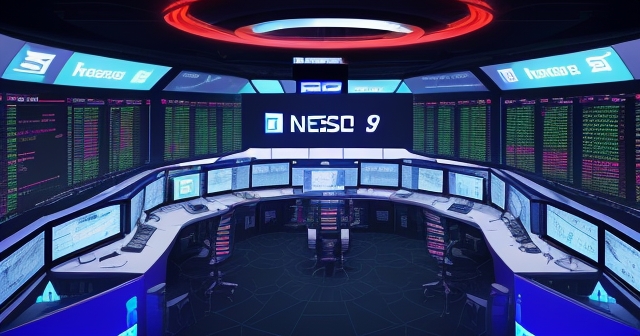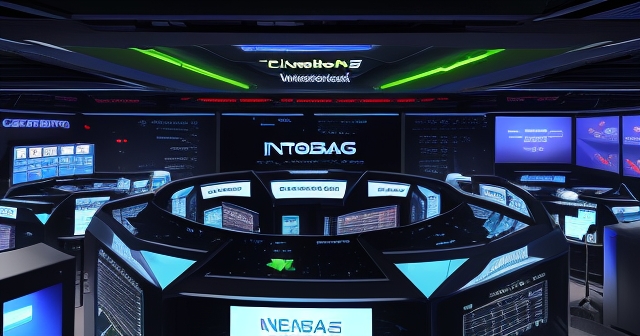Navigating the Nexus: Why Nebius Group (Formerly Yandex NV) is Resuming Trading on Nasdaq
For over two years, the Class A ordinary shares of the entity formerly known as Yandex NV have been dormant on the Nasdaq stock exchange. For many investors, this halt in trading represented a freeze on their capital, shrouded in uncertainty stemming from complex geopolitical events. Now, that long pause is set to end. On Monday, October 21, 2024, trading is scheduled to resume, marking a pivotal moment for the company, now rebranded as Nebius Group, and for the shareholders who have patiently waited.
But how did we get here? What transpired during this period of suspension? And what does the re-emergence of this European tech entity on one of the world’s premier exchanges signify for its future and for you, the investor?
Let’s embark on a journey through the intricate layers of corporate strategy, geopolitical fallout, and regulatory navigation that led to this significant development. We’ll explore the reasons behind the halt, the dramatic restructuring that occurred, and the strategic pivot that defines the new Nebius Group.

The Geopolitical Quagmire: Why Trading Halted in the First Place
The story of the Nasdaq trading halt for Yandex NV is inextricably linked to the grim reality of geopolitics. The suspension was a direct consequence of Russia’s February 2022 invasion of Ukraine. Immediately following the invasion, a wave of international sanctions swept across global markets, aimed at isolating the Russian economy and key entities associated with it.
While Yandex NV was a Netherlands-based holding company with operations spanning multiple countries, its vast majority of assets and revenue were generated within Russia. This deep entanglement with the Russian market made it highly vulnerable to the rapidly evolving geopolitical landscape. Concerns over the impact of sanctions, potential retaliatory measures from Russia, and the sheer operational uncertainty in the region led to a dramatic repricing of Russian-linked assets globally.
In this volatile environment, Nasdaq, alongside other major exchanges, took action. On February 28, 2022, Nasdaq halted trading in the shares of Yandex NV (then ticker YNDX) and several other companies heavily exposed to Russia. This was primarily a measure to protect investors from extreme volatility and to assess the impact of unfolding events and sanctions on the company’s ability to operate and its fundamental value.
For investors holding Yandex NV shares, this suspension meant their positions became illiquid. They could not buy or sell, leaving them in a state of limbo as the geopolitical crisis deepened. The future of the company’s international listing, once a symbol of its global ambition since its 2011 Nasdaq IPO, was thrown into serious doubt.
Nasdaq’s Stance: Delisting Threats and Appeals
The initial trading halt, while disruptive, was followed by even more concerning developments regarding the company’s status on Nasdaq. As the conflict in Ukraine dragged on and the operational challenges for foreign-listed Russian businesses mounted, Nasdaq began reviewing the listing status of affected companies.
In March 2023, over a year after the initial halt, Nasdaq issued a formal delisting notice to Yandex NV. This notice cited concerns about the company’s operations in Russia and the potential impact of sanctions and other regulatory hurdles on its ability to meet listing requirements, particularly regarding information flow and corporate governance standards expected of a U.S.-listed company.
A delisting would have been a severe blow, potentially forcing shareholders to sell their shares on less liquid, over-the-counter markets, likely at a significant discount. However, Yandex NV opted to appeal this decision, a complex and often lengthy process. The core of their appeal rested on demonstrating a credible path to resolving the conflict of operating primarily in Russia while being listed on a U.S. exchange under strict regulatory oversight.
Crucially, during this appeal process, Nasdaq agreed to maintain the suspended listing status, conditional on the company undertaking a significant restructuring to separate its Russian operations from its international entity. This condition became the driving force behind the monumental corporate transformation that followed, ultimately paving the way for the eventual Nasdaq trading resumption.
This outcome contrasted sharply with the fate of many other companies with substantial Russian ties that were ultimately delisted from U.S. exchanges. Yandex NV‘s unique position as a major tech player with international aspirations and assets, coupled with its willingness to undertake a drastic structural change, allowed it to pursue a different path.
The Monumental Divestment: A $5.4 Billion Severance
The condition set by Nasdaq – severing ties with the Russian business – was not a trivial undertaking. It involved carving out the vast majority of the company’s assets, including its core search engine, advertising, ride-hailing, e-commerce, and other services that were fundamental to the “Yandex” brand within Russia, and selling them to a local consortium.
This complex transaction culminated in a $5.4 billion asset sale to a consortium known as Consortium.First, a group of Russian investors. The deal, which was finalized in stages and subject to various regulatory approvals within Russia, represented the single largest corporate exit from Russia by a foreign-listed company since the 2022 invasion. The sheer scale and complexity of transferring assets, intellectual property, and operations worth billions of dollars during a period of heightened geopolitical tension cannot be overstated.
The sale effectively created two distinct entities:
- A privately held, Russian-focused entity that retains the “Yandex” brand within Russia, under local ownership.
- An internationally focused entity, based in the Netherlands, that retains certain non-Russian assets and is now free from direct operational entanglement with the Russian market.

This divestment was the critical hurdle that needed clearing. It demonstrated to Nasdaq and international regulators that the listed entity was no longer primarily a Russian company, thus mitigating the risks associated with sanctions, control, and transparency that led to the initial halt and delisting threat. For investors, it meant that the value of their shares would now be tied solely to the performance and assets of the *non-Russian* business.
The Birth of Nebius Group: A New European Identity
With the Russia asset sale complete, the international entity needed a new identity to reflect its transformed structure and strategic direction. The company formerly known as Yandex NV has officially rebranded and will trade on Nasdaq under the name Nebius Group (NBIS.O).
This renaming is far more than a cosmetic change; it signifies a fundamental divorce from the legacy “Yandex” brand, which remains with the Russian operations. Nebius Group is positioned as a Netherlands-based, European technology company. This geographical anchoring in Europe is a deliberate move to emphasize its separation from Russia and align itself with Western regulatory environments and market expectations.
For years, Yandex NV was often dubbed the “Google of Russia,” a conglomerate spanning search, advertising, cloud, e-commerce, ride-hailing, food delivery, and numerous other digital services primarily within Russia. The transformation into Nebius Group means shedding this broad, Russia-centric identity and focusing on specific, high-growth international ventures and technologies that were retained post-divestment.
Understanding this split is crucial for anyone considering investing in Nebius Group. You are no longer investing in the diverse Russian internet giant you might have known. You are investing in a newly configured entity with a specific strategic focus and a distinct asset base.

Strategic Pivot: Focusing on AI Infrastructure
What exactly is Nebius Group focused on now that it has divested its core Russian businesses? The company is strategically pivoting to become a player in the rapidly expanding global AI market, specifically emphasizing AI infrastructure and related technologies.
According to company statements, Nebius Group aims to be a leading European AI compute provider. This involves building and operating the necessary hardware and software layers – including data centers, specialized processors (like GPUs), and cloud services – that are essential for training and deploying complex AI models.
This focus aligns with massive global demand driven by advancements in generative AI and machine learning. Companies across industries require immense computing power and sophisticated infrastructure to develop their own AI applications. Nebius Group is positioning itself to capitalize on this trend.
The assets retained by Nebius Group post-divestment are central to this strategy. These include:

- A large data center located in Finland, which provides a crucial physical foundation for its cloud and AI compute services in Europe.
- International business units and technologies that were not part of the Russian sale, such as:
- Toloka AI: A global data labeling platform used for training AI models.
- Avride: A self-driving technology company focused on international markets.
- TripleTen: An online education platform for tech skills.
- Minority investments in other tech businesses outside of Russia.
To support its ambition in the AI infrastructure space, Nebius Group has announced plans for substantial investment, pledging over $1 billion by mid-2025 in this area. This level of investment signals a serious commitment to building significant capacity and capabilities in a highly competitive field currently dominated by giants like Google, Microsoft, and others, but with room for specialized players.
This strategic transformation from a diversified internet company to a focused AI infrastructure player represents both significant opportunity and execution risk. The success of Nebius Group will depend on its ability to effectively leverage its retained assets, deploy capital efficiently, and compete in a demanding global market.
The Path to Resumption: Satisfying Nasdaq’s Conditions
The journey back to public trading on Nasdaq was conditional, as we discussed, on the successful completion of the Russia asset sale. The finalization of this complex divestment process was the trigger that satisfied Nasdaq’s requirements for maintaining the listing and allowing trading to resume.
The date confirmed for the Nasdaq trading resumption is Monday, October 21, 2024. This is a specific and concrete date that shareholders and market participants have been anticipating. The period between the finalization of the sale and the resumption date allows for the administrative and technical processes required by the exchange to relist the shares under the new entity name, Nebius Group, and prepare the market for the re-opening of trading.
For shareholders who held shares during the suspension, this date means their frozen assets will become liquid again. They will be able to trade their shares of the newly configured Nebius Group on the open market. The share price will reflect the market’s assessment of the value of the new entity, its assets, strategic direction, and future prospects, entirely separate from the former Russian operations.
It’s important for investors to recognize that the company they held shares in before February 2022 is fundamentally different from the company whose shares will trade on October 21, 2024. The market valuation will need to reflect this transformation. The path to resumption was arduous, requiring significant corporate surgery, but the stated outcome is a listing on a major global exchange, providing access to international capital markets for Nebius Group and liquidity for its shareholders.
Financial Implications and Shareholder Value
The $5.4 billion received from the Russia asset sale has significant financial implications for the new Nebius Group. A substantial amount of cash is now on the balance sheet, which can be used for various purposes, including funding the ambitious AI infrastructure investments and potentially returning capital to shareholders.
In a move aimed at addressing the needs of long-suffering shareholders, Nebius Group has proposed a share buyback program. The proposal is to buy back up to 50% of its dormant shares on Nasdaq. A buyback allows the company to repurchase its own shares from the market, which can reduce the number of outstanding shares and potentially increase the earnings per share (EPS) for the remaining shares, thereby enhancing shareholder value.
A buyback of this magnitude, utilizing proceeds from the asset sale, serves multiple purposes. It provides an exit opportunity for shareholders who may wish to cash out after the long suspension and the significant change in the company’s business model. It can also signal management’s confidence in the future prospects of the new Nebius Group, believing the shares are undervalued relative to the company’s assets and strategic potential in the AI market.
The financial structure of Nebius Group is now much cleaner, focused on its international assets and the cash proceeds from the sale. This contrasts with the complex structure of the former Yandex NV, which also faced challenges related to convertible notes due in 2025, issues compounded by U.S. OFAC restrictions that could have potentially led to an Event of Default. While details on how the sale proceeds address the convertible notes are part of the complex financial restructuring, the cash infusion provides flexibility to resolve such legacy issues.
The financial profile of Nebius Group will be that of a growth-oriented technology company heavily investing in capital-intensive infrastructure (data centers, compute). Its financial performance metrics will shift from those of a broad internet conglomerate to those more aligned with cloud and infrastructure providers. Analyzing its future financials will require understanding metrics relevant to compute capacity, utilization rates, capital expenditure on infrastructure, and revenue growth from AI/cloud services.
Leadership and Governance in the New Era
The leadership structure of Nebius Group reflects its new direction and separation from the Russian business. A notable development is the return of Arkady Volozh, co-founder of Yandex, as the CEO of Nebius Group. Volozh had stepped down from his roles at Yandex NV in June 2022 after being included in an EU sanctions list, though he was later removed from this list in March 2024.
Volozh’s return at the helm of Nebius Group signals continuity in strategic vision from one of the original architects of the Yandex empire, albeit now focused exclusively on the international and AI-centric parts of the business. His experience in scaling complex technology companies will be crucial as Nebius Group seeks to establish itself in the competitive AI infrastructure market.
The governance structure of Nebius Group, as a Netherlands-based company listed on Nasdaq, will adhere to European and U.S. corporate governance standards. This includes board oversight, transparency requirements, and shareholder rights expected of companies listed on major international exchanges. This represents a significant departure from the complexities of overseeing operations embedded deeply within Russia under increasing regulatory and political pressures.
The composition of the board and executive team will be key factors for investors to evaluate. Their expertise in AI infrastructure, cloud computing, and international business expansion will be critical to the successful execution of Nebius Group’s strategy. The separation from the Russian entity also simplifies the reporting structure and reduces the potential for conflicts of interest arising from dual operations in divergent political and regulatory environments.
Navigating Future Headwinds and Opportunities
The path forward for Nebius Group is not without its challenges, despite the successful completion of the divestment and the impending Nasdaq trading resumption. The company is entering a highly competitive global market for AI infrastructure, dominated by well-established players with vast resources.
Key headwinds include:
- Intense Competition: Competing with tech giants like Microsoft (Azure), Google (GCP), Amazon (AWS), and specialized providers like CoreWeave requires significant capital, technological innovation, and sales/marketing prowess.
- Execution Risk: Successfully building out and operating large-scale AI compute capacity requires deep technical expertise, efficient capital deployment, and the ability to attract and retain top engineering talent.
- Market Perception: Overcoming the legacy perception of being primarily a Russian company and clearly communicating its new identity and strategic focus to international investors will be an ongoing task.
- Geopolitical Uncertainty: While decoupled from Russia, the broader geopolitical environment remains volatile, and unforeseen events could still impact global markets and supply chains relevant to building infrastructure.
However, the opportunities are equally significant:
- Massive Market Growth: The demand for AI infrastructure and compute power is exploding, driven by the rapid advancements and adoption of AI across industries.
- Focused Strategy: By shedding its disparate Russian businesses, Nebius Group can dedicate its resources and management attention entirely to its chosen growth areas in AI and cloud.
- Clean Structure: The clear separation from the Russian entity provides a transparent and predictable operational and financial structure, making it potentially more attractive to international investors.
- Retained Assets: The existing data center in Finland and other international businesses provide a foundation and revenue streams upon which to build.
The success of Nebius Group will hinge on its ability to aggressively invest, innovate, and execute its strategy in the face of strong competition. Its performance on Nasdaq post-resumption will be a key indicator of how the market assesses its potential to capitalize on the AI opportunity.
What This Means for Investors: Looking Ahead
If you were a holder of Yandex NV shares during the suspension, the upcoming Nasdaq trading resumption is a critical event. Your shares will now represent equity in Nebius Group, the Netherlands-based AI infrastructure company. It is essential to understand that the investment thesis for Nebius Group is fundamentally different from that of the former Yandex NV.
For new investors considering buying shares after trading resumes, this presents an opportunity to invest in a company with a clear focus on a high-growth technology sector. However, this also requires a thorough evaluation of the new entity. You should perform diligent research focusing on:
- Nebius Group’s Strategic Execution: How effectively is the company deploying its capital to build AI infrastructure? What are its competitive advantages in this space?
- Financial Health: Analyze its balance sheet post-divestment, its cash burn rate for investments, revenue generation from retained businesses, and the impact of the proposed share buyback.
- Market Position: How does Nebius Group compare to other players in the cloud and AI compute market? What is its target niche?
- Management Team: Evaluate the leadership’s experience and ability to navigate the complexities of building a global AI business.
The market’s initial reaction when trading resumes on October 21, 2024, will be significant. There may be pent-up selling pressure from long-term shareholders looking to exit, as well as buying interest from investors keen on the new AI focus. Liquidity in the initial days could be volatile.
Understanding the history, the reason for the halt, the details of the $5.4 billion Russia asset sale, and the strategic repositioning as Nebius Group is vital. This is not simply the old Yandex returning; it is a new company emerging from a complex corporate restructuring driven by extraordinary circumstances.
Conclusion: A New Chapter Begins on Nasdaq
The scheduled Nasdaq trading resumption for Nebius Group on Monday, October 21, 2024, marks the culmination of a remarkable corporate transformation story. From being the dominant internet player in Russia, enmeshed in geopolitical challenges leading to a prolonged stock trading suspension and delisting threat, the company has navigated a complex $5.4 billion divestment to emerge as a focused European entity.
The strategic pivot towards AI infrastructure and cloud services positions Nebius Group in a sector with explosive growth potential. The company’s ability to leverage its retained international assets, invest wisely, and compete effectively in this demanding market will determine its success moving forward.
For investors, this is an opportunity to re-evaluate their position or consider a new investment based on the merits of Nebius Group’s new strategic direction, distinct from its complex past. The return to public trading on Nasdaq provides a platform for the company to access global capital and for investors to participate in its redefined journey.
As Nebius Group takes its first steps back onto the public stage, the market will be watching closely to see how this newly forged entity performs. It’s a testament to corporate resilience and strategic adaptation in the face of unprecedented global events, opening a new chapter for the company and its shareholders on the Nasdaq exchange.
| Key Events | Date | Implications |
|---|---|---|
| Nasdaq trading halt | February 28, 2022 | Protection from extreme volatility due to geopolitical tensions |
| Delisting notice issued | March 2023 | Concerns over operational viability and sanctions impact |
| Asset sale finalization | Late 2023 | Facilitates corporate restructuring and satisfies Nasdaq requirements |
| Trading resumption | October 21, 2024 | New entity Nebius Group hits the market |
| Challenges | Opportunities |
|---|---|
| Intense competition from major tech players | Massive growth in AI infrastructure demand |
| Execution risk in building AI capabilities | Focused strategy after shedding Russian operations |
| Market perception issues | Clean operational structure attracting investors |
| Geopolitical uncertainty risks | Retained valuable assets and revenue streams |
| Financial Insight | Detail |
|---|---|
| Total cash from asset sale | $5.4 billion |
| Proposed share buyback | Up to 50% of dormant shares |
| Investment pledge for AI | Over $1 billion by mid-2025 |
when will yandex trade againFAQ
Q:When will Nebius Group resume trading on Nasdaq?
A:Trading is scheduled to resume on October 21, 2024.
Q:What was the reason for the trading halt of Yandex NV?
A:The trading halt was primarily due to the geopolitical implications stemming from Russia’s invasion of Ukraine.
Q:What has changed with the restructuring into Nebius Group?
A:Nebius Group has divested its Russian operations and is focusing on AI infrastructure and technologies.

留言